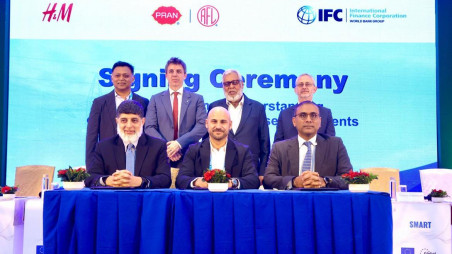Staff Correspondent
Published:2025-04-10 09:43:33 BdST
H&M, Pran, IFC join hands to promote renewable electricity in RMG sector
H&M Group, Pran Group and IFC teamed up to advance the agenda of renewable electricity in Bangladesh's readymade garment (RMG) sector.
In this connection, the three organisations signed a memorandum of understanding (MoU) to further renewable electricity uptake in the RMG industry, according to a statement.
Energy secretary Muhammad Fouzul Kabir Khan was present at the event held on Wednesday at a session of Bangladesh Investment Summit 2025 held in a city hotel.
The MOU paves the way for piloting the first CPPA (Corporate Power Purchase Agreement) in Bangladesh, therefore creating the basis for advancing the legal framework that will enable a systematic reduction of the carbon emissions from this key industry of the country, added the statement.
It added that under this project, with financing from the IFC (International Finance Corporation) and the leading role of Pran RFL Group, H&M Group will connect a number of selected suppliers to a new solar park.
The innovative project will constitute the first off-site solar park that will utilise the grid transmission, reaching several RMG factories, that will immediately reduce their emissions.
Additionally, this project will further facilitate the path of the industry towards electrification.
In order to reduce greenhouse gas emissions, and reach the H&M goal to source 100 per cent renewable electricity in the supply chain by 2030, it is the key that H&M's suppliers have access to renewable electricity and solutions in a shift from fossil fuels.
And for this to be possible Corporate Power Purchase Agreements are a key reform. With CPPA, the factories can selectively buy from the grid the renewable energy, through specific contracts.
This will increase the options available today for suppliers. Indeed, there are at the moment limitations to procuring renewable energy: on-site solar projects are capped by the extent of the available rooftops and the portion of the grid that is renewable is at the moment very low (below 5 per cent).
Additionally, legal developments towards enabling CPPA will ensure the next steps of electrification, which is now proven to be the only possible systemic approach to reducing carbon emissions, added the statement.
"Finally, in this way the industry can diversify its fuel use, which today in Bangladesh is largely dependent on gas."
IFC has been involved globally to support the development of renewable energy aligned to IFC's climate commitments, while Pran Group is a pioneer in the area of renewable energy, it said.
H&M Group will support its suppliers’ connection to the project, therefore immediately supporting its commercial viability.
The participation of the Government at the signing ceremony will make sure that learnings of this project can support the next steps of Bangladesh authorities to make CPPA a reality in the country.
The shift towards renewable energy will be a key to maintaining the competitiveness of the RMG industry of Bangladesh, against changing regulatory environment that will require a reduced environmental footprint for products imported to the European Union markets and beyond, it added.
The statement quoted H&M regional country manager Ziaur Rahman as saying, "One of the major obstacles on our decarbonisation journey is access to renewable alternatives in our supply chain."
That is where most of the greenhouse gas emissions take place, and also where they need to find partnerships and industry-wide solutions, he said.
This MoU paves the way for Bangladesh to advance policy reforms and open up for future opportunities to connect the RMG industry with renewable energy generation.
Citing researches, the statement said the fashion industry is one of the highest emitting industries, responsible for between 5.0 percent and 10 percent of global emissions.
More than 60 percent of a garment's climate impact happens during manufacturing, the so-called scope 3 emissions. The production of fibers, material processing, dyeing, and finishing necessitates a substantial amount of energy and relies heavily on various natural resources.
Unauthorized use or reproduction of The Finance Today content for commercial purposes is strictly prohibited.


